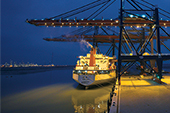Driving Growth and Employment Through Logistics
Logistics clusters create jobs that are difficult to move offshore and lead to economic growth in multiple sectors.
Topics

The Port of Rotterdam is the center of a logistics cluster that has grown to employ 50,000 people directly and another 90,000 indirectly.
Image courtesy of Port of Rotterdam.
Ever since British economist Alfred Marshall wrote about the importance of industry clusters in his classic 1920 book Principles of Economics, academics and policymakers have been trying to understand and nurture the ingredients that are essential to industrial success. In the late 1990s, business strategist Michael Porter argued that clusters make businesses more competitive by increasing the pace of innovation and stimulating new business formation. National and regional governments quickly embraced the idea that once they seeded a cluster, good things would happen: Businesses would be drawn to the area and attract employees and more employers, and these activities would feed on themselves, leading to economic growth.
In recent decades, numerous industrial clusters have developed around the world. Some of the best known are the knowledge clusters around Silicon Valley (for information technology), Hollywood (for entertainment), and Boston (for life sciences). In each case, one of the most powerful lures for companies and employees has been knowledge spillover. Strong clusters are ecosystems of venture capital resources, universities, research centers, employers, highly skilled workers and institutions for collaborations, such as chambers of commerce. There are questions, however, about the nature of the economic benefits knowledge clusters are capable of generating. While such clusters can generate employment for highly skilled engineers and scientists, for the most part they do less to directly address the problem of unemployment among less educated and less trained workers.
The Benefits of Logistics Clusters
Many economists believe that the manufacturing sector in the West will have an uphill climb because of a long-term disadvantage in labor cost and flexibility compared with developing countries. But there is another sector — logistics — where industrial clusters have a brighter long-term future.
Logistics clusters are local networks of businesses that provide a wide array of logistics services, including transportation carriers, warehousing companies, freight forwarders and third-party logistics service providers. They also include the distribution operations of retailers, manufacturers (for both new products and aftermarket parts) and distributors. These clusters attract companies for whom logistics is a critical element of their service offering or a large part of their overall costs.

Comment (1)
Forum March Program: STL Regional Freightway Connects the Dots - ConstructForSTL